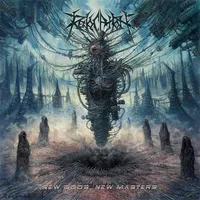New Gods, New Masters

Revocation: Forged Into a New Level
Before hitting play on New Gods, New Masters, I can’t help but think about the path Revocation has carved out. Born in Boston, the band has always thrived on turning chaos into structure, stitching together the fury of thrash with the precision of technical death metal. Led by Dave Davidson, they’ve never settled for repeating formulas: each album has been a step forward, and now, on their ninth record, they deliver something heavier, darker, and at the same time more daring. With Harry Lannon joining on rhythm guitar and Alex Weber on bass, there’s fresh blood in the lineup, but without sacrificing the visceral identity that’s defined them from the start. And as if that weren’t enough, the album is spiced up with guest appearances that don’t just decorate the songs but expand the soundscape and add unexpected bursts of energy.
The First Impact: The Storm Unleashed
When the record begins, it feels like diving headfirst into a vortex of dense riffs, searing solos, and relentless drumming. The title, New Gods, New Masters, isn’t just a name, it’s almost a warning that the band is ready to claim their place on a higher tier of the metal pantheon. The brutality is constant, but it never feels repetitive, there’s always a detail, a rhythmic twist, or a melodic flourish that keeps you locked in. And right in the middle of this storm, 'The All Seeing' emerges, an instrumental that acts as a strategic pause and a doorway into something entirely different. This is where Gilad Hekselman steps in, layering jazz-infused guitar lines that breathe air into the chaos. The contrast is so striking it turns the track into one of the album’s most fascinating highlights.
Shadows and Collaborations
Some of the record’s most powerful moments come directly from the collaborations. On 'Confines of Infinity', the presence of Travis Ryan (Cattle Decapitation) injects an even more grotesque weight alongside Davidson’s vocals. The track swells like a furious beast, each growl from Ryan digging deeper into the abyss. Then there’s 'Cronenberged', featuring Jonny Davy (Job for a Cowboy). The result is a vocal collision that borders on apocalyptic: both voices sound as if they’re competing for dominance inside the same eruption of sound. That interplay gives the track a unique intensity, almost cinematic in its violence. And circling back to Gilad Hekselman, his contribution to 'The All Seeing' isn’t just an experiment, it shows the band’s boldness in embracing unlikely elements without ever losing their identity. For a few minutes, metal allows itself to be invaded by another musical language, and it emerges stronger because of it.
The Album as a Living Organism
Listening to New Gods, New Masters from start to finish feels like crossing a living, breathing organism. The record alternates between sheer aggression and carefully placed breathing spaces, always maintaining a sense of tension. Even when a track feels less memorable on its own, it works within the larger flow, setting the stage for the next peak. If there’s a risk here, it’s the sheer overload of ideas, which might overwhelm those unaccustomed to technical metal. But for those willing to dive headfirst into this universe, that’s precisely the appeal: to be challenged, pushed to the limit, and surprised by twists that seem misplaced until they suddenly make perfect sense.
Conclusion: A Manifesto in Sound
By the time the album ends, the message is clear: Revocation haven’t just released another record, they’ve written a manifesto. They prove there’s still room for brutality with brains, technicality with emotion, tradition with boldness. The guest contributions aren’t embellishments but catalysts that make certain tracks unforgettable. For me, New Gods, New Masters is one of those albums you don’t simply listen to, you endure it, traverse it. It wounds, fascinates, and provokes all at once. A testament that, in the landscape of modern metal, Revocation remain among the most fearless and inventive bands out there.


